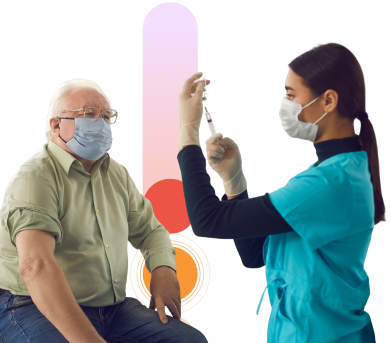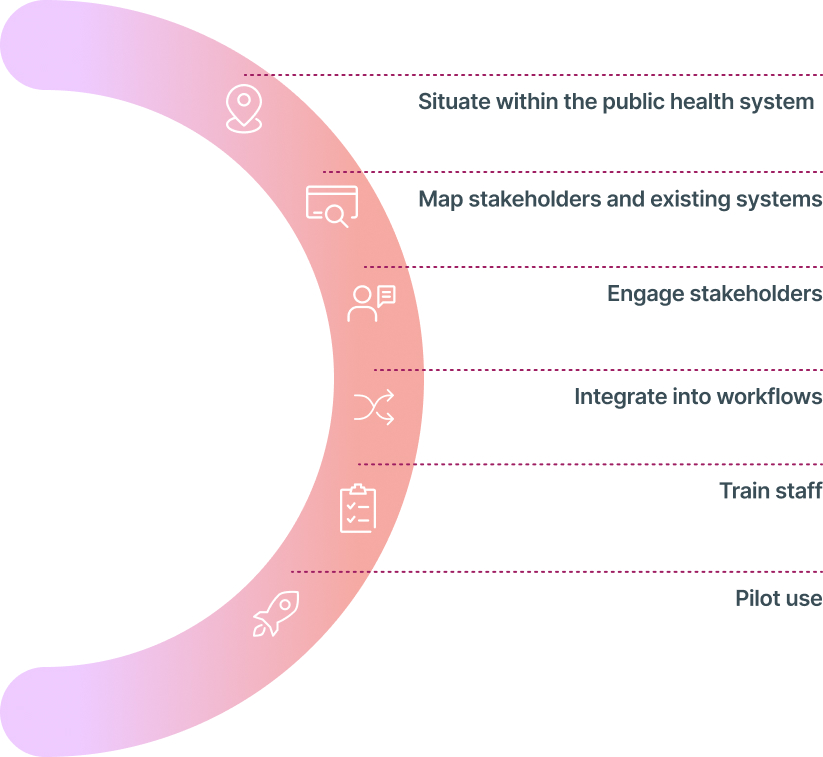Get Started

Advocate for 7-1-7

Adopt 7-1-7
Adopt 7-1-7

Adopt 7-1-7
Train staff
Integrate into workflows
Pilot use
Situate within the public health system
Map stakeholders and existing systems
Engage stakeholders
Join the Alliance
Is your country ready to adopt the 7-1-7 target? Can your institution support countries to implement, sustain and scale 7-1-7? Become a partner of the 7-1-7 Alliance.
The 7-1-7 Alliance partners with Ministries of Health, National Public Health Institutes, multilateral organizations, international non-governmental organizations and more to help all countries achieve the 7-1-7 target. As partners of the 7-1-7 Alliance, countries can access:
- Technical support
- Catalytic grants to support 7-1-7 adoption
- Community of Practice
If your institution is interested in becoming a 7-1-7 Alliance partner, reach out to the 7-1-7 Alliance Secretariat at [email protected].

Join the Alliance
Is your country ready to adopt the 7-1-7 target? Can your institution support countries to implement, sustain and scale 7-1-7? Become a partner of the 7-1-7 Alliance.
If your institution is interested in becoming a 7-1-7 Alliance partner, reach out to the 7-1-7 Alliance Secretariat at [email protected].

Community of Practice
The Community of Practice is designed for technical teams implementing 7-1-7 and EARs. 7-1-7 Alliance country partners are automatically invited to join when they become partners.
Other interested countries and partners may request to join by completing a request form.
Members of the Community of Practice:
- explore adoption and use of the 7-1-7 target in country context
- identify challenges and drivers for performance improvement
- evaluate 7-1-7 implementation
- conduct research to strengthen evidence-based implementation
Community of Practice activities include:
- Regular community engagement sessions with focused discussions and country spotlights
- Early access to tailored implementation resources
- Topic-specific sub-working groups based on geographic region or shared technical challenges
Funding Opportunities
Catalytic country grants
The 7-1-7 Alliance is currently accepting applications for short to medium-term grant funding (6-12 months) to support the adoption of the 7-1-7 target and Early Action Reviews (EARs) and lay the groundwork for implementation (e.g., stakeholder mapping, training, integration of 7-1-7 workflows into emergency operation centers, event management systems, and other surveillance activities).
Eligible institutions include ministries of health, national public health institutes and other country partners working at the national, subnational, and local level in low- and middle-income countries. Governments may also nominate a non-governmental organization to manage and administrate the grant.
The Alliance will also consider applications from civil society organizations (CSO) that have a relationship with government and have a proven track record in supporting emergency operation centers or health security initiatives. CSO applicants will need to submit a letter of endorsement from government partners with their application acknowledging their partnership toward achieving the 7-1-7 target and appropriate expertise.
The 7-1-7 Alliance does not provide funding to countries subject to the U.S. Treasury Office of Foreign Asset Control (“OFAC”) sanctions.
Catalytic country grants are reserved for 7-1-7 Alliance partners. Partners interested in the grants should contact their 7-1-7 Alliance Technical Advisor.
Operational research grants

The 7-1-7 Alliance, with funding from Wellcome Trust, is supporting 11 operational research projects following two calls for proposals in 2024.
There are currently no open call for proposals. Get notified of upcoming opportunities by signing up for our email updates.
Questions about operational research?
External funding mechanisms
In addition to catalytic funding, the 7-1-7 Alliance is working with countries and technical partners to leverage larger external funding mechanisms, such as the Pandemic Fund, World Bank Multi-phase Awards, Global Fund COVID-19 Response Mechanism, and more. Many of these funding mechanisms have integrated the 7-1-7 target into their impact and results frameworks and provide an important opportunity to leverage larger-scale funding to support sustained use of 7-1-7 use.
The 7-1-7 Alliance is able to support countries adopting and implementing 7-1-7 through these funding mechanisms, including ongoing technical assistance, engagement with other implementing partners through our Community of Practice and Global Learning Network, suite of adoption and implementation tools as well as our data and monitoring and evaluation framework.
Countries that have included 7-1-7 as part of their proposals for those funding opportunities or are interested in doing so are encouraged to read this brief with actionable guidance and cost estimates for 7-1-7 adoption, and to reach out to the 7-1-7 Alliance at [email protected].
